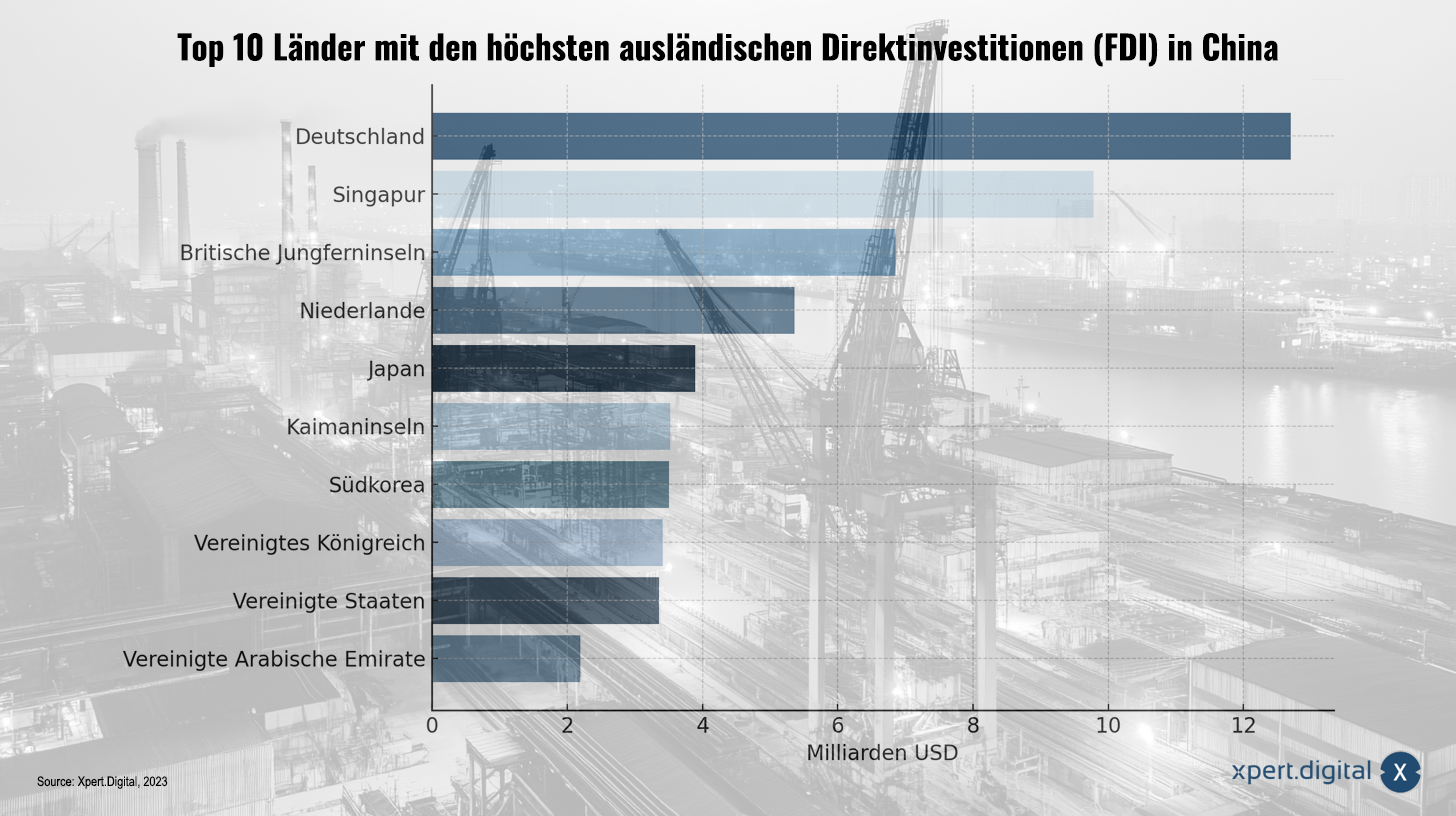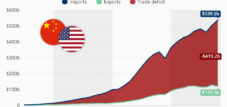Apart from Germany, other Western countries see significant risks in direct investments in China
Language selection 📢
Published on: December 3, 2024 / Update from: December 3, 2024 - Author: Konrad Wolfenstein

Apart from Germany, other Western countries see significant risks in direct investments in China - Image: Xpert.Digital
📈🛠️ German investments in China on record: What's behind the strategy?
🤝🇩🇪🇨🇳 Economic partner despite risks: Germany's exceptional role in China
The economic relationship between Germany and China has been the focus of international attention for years. While many western countries are traveling their direct investments in China due to various risks, Germany remains an exception. German companies continue to pursue the strategy “Produce in China” in China, which means that they are expanding their production capacities in the People's Republic to operate the market there directly. This strategy has led to an increase in German direct investments in China and is expected to continue to rise.
Here is the list of the top 10 countries with the highest foreign direct investment (FDI) in China, sorted by volume (in billion US dollars):
- Germany – approximately USD 12.70 billion
- Singapore – $9.78 billion
- British Virgin Islands – $6.86 billion
- Netherlands – $5.36 billion
- Japan – $3.89 billion
- Cayman Islands – $3.52 billion
- South Korea – $3.51 billion
- United Kingdom – $3.41 billion
- United States – $3.36 billion
- United Arab Emirates – $2.20 billion
Hong Kong is not listed with $111.18 billion. Hong Kong is China, a SAR – Special Administrative Region. The British Virgin Islands are internationally known as an offshore financial center as it is a popular location for company formation and tax planning.
🚀 Risks and perspectives: The German strategy and its risks
German companies hope to minimize their risks through local production in China. The idea behind it is two-fold: on the one hand, the dependence on China in the global supply chains should be reduced, on the other hand, production for the Chinese market should be increased. This assumption is based on the hope that Chinese demand will pick up again and German companies can benefit from it. But this hope is becoming increasingly fragile as weakness in Chinese consumer demand continues.
A further risk arises from the special competitive environment in China. Competition there does not work as it does in typical capitalist markets. The central planning authorities in Beijing favor domestic companies that also benefit from close ties to the state and party apparatus. These relationships give them a significant information advantage, making it difficult for foreign companies to compete on fair terms.
⚠️🔍 An ignored danger: ignorance of a possible China crisis
The behavior of the German automotive and chemical industries is particularly striking. Despite stagnating or even falling sales, they are increasing their investments in China, especially in local research and development centers. This leads to an increased brain drain and the outflow of German technologies to China. Instead of strengthening Germany's competitive position, this could mean undermining it in the long term.
German industry seems to be setting out on its own course again, similar to energy policy before the Ukraine conflict. It ignores the federal government's new China concept and rejects calls for decoupling. Even the concerns of countries like Japan and South Korea, which are well informed about conditions there due to their geographical proximity to China, are brushed aside.
A major crisis in German-Chinese economic relations could occur at any time, especially if geopolitical tensions escalate. If, for example, Donald Trump were to declare an economic war against China again, German companies would be faced with the challenge of having to choose between the USA and China.
🌐🔒 Cautious Strategies: International Perspective: Why Other Countries Are More Cautious
Many industrialized nations are cautious about investing in China for several reasons:
Regulatory and political risks
The Chinese government has tightened its control over the economy. Stricter data security regulations and national security laws are making it more difficult for foreign companies to operate in China. They are often forced to share technology and work under uncertain legal frameworks.
Geopolitical tensions
The increasing tensions between China and other major economic powers, especially the USA, have worsened the investment climate. The US-China trade war has increased political risks, causing many companies to reconsider or withdraw their investments in China.
Economic uncertainties
China's economic growth has slowed due to structural problems such as the housing crisis and weak consumer demand. These challenges make it less attractive for foreign investors to invest capital in China.
Limited market access
Despite some reforms, access to many sectors for foreign investors remains limited. The Chinese government continues to support domestic companies through subsidies and preferential treatment.
These factors are causing many industrialized nations to reduce their direct investments in China or to act very cautiously.
🎲🌟 Weigh and bet: A risky bet on the Chinese market
German industry is making a risky bet with its strategy. While other countries are acting more cautiously due to regulatory uncertainties and geopolitical tensions, German companies continue to rely heavily on the Chinese market. This strategy could prove to be a double-edged sword: on the one hand, the huge Chinese market offers enormous opportunities for growth and profitability; on the other hand, it harbors considerable risks due to political uncertainties and economic challenges.
It remains to be seen whether German industry will be successful with its strategy in the long term or whether it will ultimately be forced to adjust its course in the face of a changing global landscape. In any case, it is crucial that Germany carefully weighs up its economic interests and remains flexible enough to be able to react to unforeseen developments.
📣 Similar topics
- 📊 Germany's economy in China: A double-edged strategy
- 🌏 German companies and their risky bet on the Chinese market
- ⚙️ “In China for China”: risk management or miscalculation?
- 🚦 Geopolitical tensions: Why Germany's China strategy could be dangerous
- 📉 Weakness in consumer demand: China's slowdown and German investments
- 🇩🇪💡 Brain drain and technology transfer: risks for Germany as a location
- 🏗️ Billions in investments despite crises: Why German companies stay in China
- 🌐 International restraint vs. German determination: A comparison
- 🔒 Regulatory hurdles and competitive disadvantages: German companies under pressure
- 📉 Economic uncertainties in China: Germany's strategic ignorance
#️⃣ Hashtags: #Economy #ChinaStrategy #Geopolitics #GermanIndustry #Investment Risk
Our recommendation: 🌍 Limitless reach 🔗 Networked 🌐 Multilingual 💪 Strong sales: 💡 Authentic with strategy 🚀 Innovation meets 🧠 Intuition
At a time when a company's digital presence determines its success, the challenge is how to make this presence authentic, individual and far-reaching. Xpert.Digital offers an innovative solution that positions itself as an intersection between an industry hub, a blog and a brand ambassador. It combines the advantages of communication and sales channels in a single platform and enables publication in 18 different languages. The cooperation with partner portals and the possibility of publishing articles on Google News and a press distribution list with around 8,000 journalists and readers maximize the reach and visibility of the content. This represents an essential factor in external sales & marketing (SMarketing).
More about it here:
🌏 Why do German companies invest so heavily in China?
💼🚀 German companies have been investing heavily in China for years. This trend continues even though geopolitical uncertainties and economic tensions between China and Western countries are increasing. These investments are not only strategically important, but also a reflection of economic reality and international competition. The following explains why German companies are investing so heavily in China, what opportunities and challenges arise and what effects this could have on the German economy in the long term.
📈 Reasons for German companies to invest in China ⚙️💡
1. Secure competitiveness
A central driving force for German companies to invest in China is the desire to remain competitive. China is not only the second largest economy in the world, but also a gigantic sales market with over 1.4 billion people. German companies, especially from the automotive and mechanical engineering sectors, see themselves forced to act locally in order not to lose touch with global competitors.
“Anyone who is not present in China today will lose touch with international competition tomorrow,” could be the credo of many company leaders. The automotive industry in particular, a central pillar of the German economy, is investing heavily, as China is the world's largest market for electric vehicles and premium vehicles.
2. Exploit market potential
China offers enormous market potential that goes beyond the automotive sector. Sectors such as chemicals, pharmaceuticals, consumer goods and renewable energies are benefiting from the growing middle class and the increasing purchasing power of the Chinese population. German companies such as BASF and Bayer are banking on this growth and have invested billions in expanding their local production capacities in recent years.
3. Innovation leadership
China's rapid technological progress makes the country not only a sales market, but also an innovation hub. German companies value the dynamism and agility of Chinese industry. “Made in China 2025,” the government’s strategy to promote high technologies, has created an ecosystem that accelerates innovation. German companies see great potential, particularly in areas such as artificial intelligence, battery technology and automation.
Around 37 percent of German companies state that they use China not only as a production location, but also as a development location. Many German automobile manufacturers and suppliers now operate research and development centers in China to develop new technologies that can also be applied on a global level.
4. Reinvestment of profits
A large part of German direct investment in China consists of reinvested profits. Companies that are already established locally use their profits to further expand their market position. This is a sign that German companies are planning for the long term and have confidence in Chinese economic growth, despite the existing challenges.
⚠️ Challenges for German companies in China
1. Unfair competition conditions
Many German companies feel disadvantaged on the Chinese market. Unfair competition conditions, such as informal access restrictions, unequal treatment in public tenders and government subsidies for local competitors, make business more difficult. These restrictions primarily affect medium-sized companies, which have fewer resources for lobbying and legal disputes compared to large corporations.
2. Geopolitical risks
The geopolitical tensions between China and the USA as well as the possible escalation of the Taiwan conflict represent significant risks. Such tensions could lead to trade barriers, sanctions or even a complete realignment of global supply chains. In this context, the German federal government has presented its “de-risking” strategy to reduce dependence on China. Nevertheless, it remains difficult for many companies to find alternative markets that are as attractive as China.
3. Dependence on supply chains
Despite efforts to diversify, German companies are still heavily dependent on Chinese supply chains. Many companies pursue the “In China for China” strategy to minimize risks. This strategy means that production and sales take place directly in China, without relying heavily on exports. But this local production also entails risks, for example due to regulatory changes or political tensions.
4. Cultural and legal differences
In addition to economic and geopolitical challenges, German companies also face cultural and legal hurdles. China's business culture is significantly different from Europe's, and the complexity of local legislation can be opaque for foreign companies. Corruption, bureaucracy and a lack of legal certainty are often cited as additional obstacles.
🌟 Opportunities and future prospects
1. Technological partnerships
Despite the challenges, the Chinese market still offers great potential for technological partnerships. German companies can benefit from collaboration with Chinese companies to open up new markets and develop innovative technologies. This is particularly true in the area of green technologies such as hydrogen, renewable energies and electromobility.
2. Diversification of business models
The presence in China enables German companies to diversify their business models. In addition to local production and sales, services, digital platforms and new sales channels such as e-commerce are becoming increasingly important.
3. Sustainability initiatives
China has made significant progress in sustainability in recent years. By investing in sustainable technologies and business models, German companies can not only strengthen their market position, but also make a contribution to the global energy transition.
⚖️ Balancing act between economic success and political responsibility
The investments by German companies in China are an expression of a long-term strategy that brings with it both opportunities and risks. While China's enormous market and innovation potential remains a strong incentive, geopolitical tensions and uneven playing fields pose serious challenges. The future will show whether German companies can successfully adapt their strategies to benefit from the advantages of the Chinese market while minimizing the risks.
The central question remains: Can German companies reduce their dependence on China without giving up their competitiveness? The balancing act between economic success and political responsibility will play a crucial role in the coming years.
📣 Similar topics
- 📌 Why German companies rely on China
- 🌏 China: economic partner or risk?
- 🚀 Investing in China: opportunity or danger?
- 💡 Innovation leadership through technical collaborations
- 🌱 Sustainability and business opportunities in China
- 🇨🇳 Balancing China and geopolitical tensions
- 💼 Overcome challenges in the Chinese market
- ⚙️ How German companies ensure their competitiveness in China
- 🌐 “in China for China”: supply chain strategy of the future
- 📊 Long-term prospects for German investments in China
#️⃣ Hashtags: #ChinaInvestments #Competition #Geopolitics #GermanEconomy #Sustainability
We are there for you - advice - planning - implementation - project management
☑️ SME support in strategy, consulting, planning and implementation
☑️ Creation or realignment of the digital strategy and digitalization
☑️ Expansion and optimization of international sales processes
☑️ Global & Digital B2B trading platforms
☑️ Pioneer Business Development
I would be happy to serve as your personal advisor.
You can contact me by filling out the contact form below or simply call me on +49 89 89 674 804 (Munich) .
I'm looking forward to our joint project.
Xpert.Digital - Konrad Wolfenstein
Xpert.Digital is a hub for industry with a focus on digitalization, mechanical engineering, logistics/intralogistics and photovoltaics.
With our 360° business development solution, we support well-known companies from new business to after sales.
Market intelligence, smarketing, marketing automation, content development, PR, mail campaigns, personalized social media and lead nurturing are part of our digital tools.
You can find out more at: www.xpert.digital - www.xpert.solar - www.xpert.plus


























